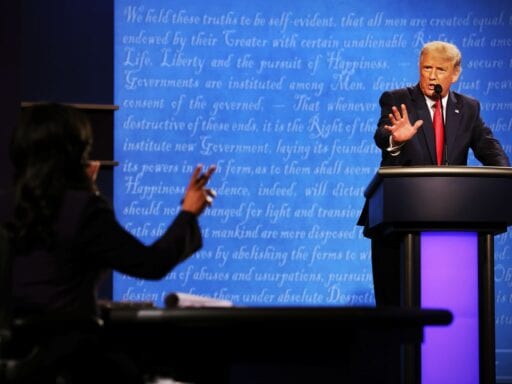Trump “only” interrupted 34 times this time.
By Vox’s count, there were 96 interruptions and interjections in Thursday’s final presidential debate in Nashville, Tennessee.
President Donald Trump was responsible for 65 percent of the interruptions — substantive moments where he spoke over another person, stopping the conversational flow — and former Vice President Joe Biden was responsible for 67 percent of the shorter interjections, chiming in with comments like “not true” or “oh, come on.” (More on how we counted below).
At one point, after debate moderator Kristen Welker asked Biden about his vote for the 1994 crime bill, Trump repeatedly pushed the former vice president on why he didn’t accomplish his proposed criminal justice reforms during his eight years in the White House.
Trump: You had eight years to get it done. Now you’re saying you’re going to get it done because you’re all talk and no action, Joe.
Welker [indicating Biden]: Your response.
Biden: We got a lot of it done —
Trump: You didn’t get anything done.
Biden: 38,000 prisoners —
Trump: You got nothing done.
That was one of Trump’s 34 interruptions. Biden interrupted Trump occasionally as well (17 times by our count), but was much more likely to toss in a sarcastic or incredulous rejoinder, as he did when Trump was discussing climate change:
Trump: Solar doesn’t have it yet. It’s not powerful enough yet to really run our big beautiful factories that we need to compete with the world. So —
Biden: False.
Trump: It’s all a pipe dream …
In the first presidential debate, as Vox’s Zack Beauchamp reported, Trump “used interruption as his central strategy, attempting to fluster Biden and prevent him from making actual substantive arguments. Instead of engaging on the merits, Trump deliberately turned the first presidential debate into a carnival.”
While we didn’t count the interruptions in the first debate, the follow-up certainly felt more civil (and by Slate’s measure, Trump interrupted 128 times all by himself in the first debate). This could be a win for the Commission on Presidential Debates, which introduced a mute button following the first unwieldy debate, but it’s equally plausible Trump’s relative restraint is due to polling indicating Americans didn’t approve of his first performance.
What is an interruption?
Interruptions are really hard to define.
As Kristin Anderson, professor of psychology at the University of Houston, told FiveThirtyEight in 2016 after another interruption-laden debate, “It’s unimaginable how many definitions of interruptions I’ve seen in the [scientific] literature. These are definitions that have to be operationally defined and submitted to peer review, and you still get a lot.”
Vox used the following rules for counting interruptions and interjections:
- An interjection is when an individual speaks over another for a few words, but does not stop the flow of the original speaker.
- An interruption is when one individual speaks over another for more than a few words. Whether that individual succeeds in taking over the debate, or simply makes an attempt to while the original speaker continues to speak, does not affect whether we considered it an interruption.
- Someone who was interrupted and attempts to keep talking over the interrupter is not, himself, interrupting.
- We did not count laughs, scoffs, etc. as interruptions or interjections.
If after reading these rules you think there’s still quite a bit of room for subjectivity, you’re right, and it’s for good reason.
Imagine a normal conversation where someone who is listening says “yeah” in agreement with you while you’re speaking. That’s not something we’d usually consider to be an interruption, because in our normal lives we use tone and context to judge these exchanges. As FiveThirtyEight’s Maggie Koerth explained four years ago, there’s “something scientists call ‘back-channeling’ — the ‘yeah’ or ‘mm-hmmms’ that we all toss out while listening … and which are generally meant to encourage the speaker to continue.”
However, during a debate it’s difficult for us to judge objectively which of these interjections are truly disruptive and which were not intended to be. So we defaulted to counting them.
What’s clear from the breakdown of interjections versus interruptions is that Biden is much more likely to stop talking once he interjects and the other person doesn’t cede the floor. He also allowed himself to use verbal tics like “oh god” while Trump was speaking which, while non-disruptive, did spike his tally of interjections significantly.
Joe Biden is a master of the incredulous “come on!”
— Matthew Yglesias (@mattyglesias) October 23, 2020
It’s too soon to tell how Americans will view the final debate. But the chaos of the first debate may have set the bar low enough for Trump to appear reasonable — despite “only” interrupting his rival and the moderator 34 times.
Will you help keep Vox free for all?
The United States is in the middle of one of the most consequential presidential elections of our lifetimes. It’s essential that all Americans are able to access clear, concise information on what the outcome of the election could mean for their lives, and the lives of their families and communities. That is our mission at Vox. But our distinctive brand of explanatory journalism takes resources. Even when the economy and the news advertising market recovers, your support will be a critical part of sustaining our resource-intensive work. If you have already contributed, thank you. If you haven’t, please consider helping everyone understand this presidential election: Contribute today from as little as $3.
Author: Jerusalem Demsas
Read More



